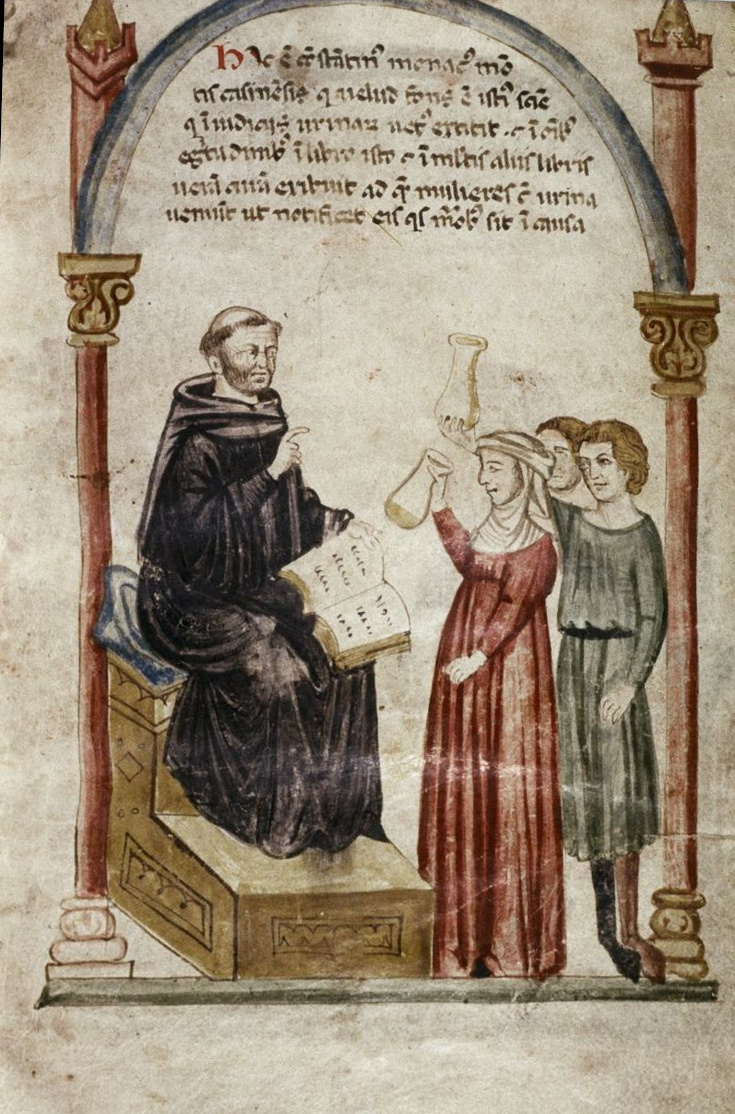Constantine the African
 Constantine the African (; died before 1098/1099, Monte Cassino) was a physician who lived in the 11th century. The first part of his life was spent in Ifriqiya and the rest in Italy. He first arrived in Italy in the coastal town of Salerno, home of the Schola Medica Salernitana, where his work attracted attention from the local Lombard and Norman rulers. Constantine then became a Benedictine monk, living the last decades of his life at the abbey of Monte Cassino.
Constantine the African (; died before 1098/1099, Monte Cassino) was a physician who lived in the 11th century. The first part of his life was spent in Ifriqiya and the rest in Italy. He first arrived in Italy in the coastal town of Salerno, home of the Schola Medica Salernitana, where his work attracted attention from the local Lombard and Norman rulers. Constantine then became a Benedictine monk, living the last decades of his life at the abbey of Monte Cassino.There is some debate about his birth and family religion, although it is well known that he ended his life as a monk at the Latin Christian Abbey of Monte Cassino, in southern Italy. This religious controversy suggested that he might born as Muslim, and after migration converted to catholic Christian, or he might born as Christian within an Arabic-speaking family. The native language of Constantine the African was Arabic. He was also fluent in Greek, Latin, and other languages, the skills he acquired during his extensive travels. His journey included Egypt, Syria, India, Ethiopia, and Persia. He was well-versed in medical knowledge before his arrival to Salerno in Italy where he joined the abbey of Monte Cassino south of Rome in 1077.
It was in Italy where Constantine compiled his vast opus, mostly composed of translations from Arabic sources. He translated into Latin, books of the great masters of Arabic medicine: Razes, Ibn Imran, Ibn Suleiman, and Ibn al-Jazzar; these translations are housed today in libraries in Italy, Germany, France, Belgium, and England. They were used as textbooks from the Middle Ages to the seventeenth century. Provided by Wikipedia
1
2
3
4
5
6
7
8
9
10
11
12
by Zahrāwī, Ḫalaf Ibn-Abbās <<az->> 936-1009
Published 1541
Other Authors: ';
“...Constantinus Africanus 1020-1087...”Published 1541
Book
13
by Zahrāwī, Ḫalaf Ibn-Abbās <<az->> 936-1009
Published 1541
Other Authors: ';
“...Constantinus Africanus 1020-1087...”Published 1541
Book
14
by Zahrāwī, Ḫalaf Ibn-Abbās <<az->> 936-1009
Published 1541
Other Authors: ';
“...Constantinus Africanus 1020-1087...”Published 1541
Digitalisat in e-rara
eBook
15
by Synerus Medicus ca. 2.Jh.n.Chr.
Published 1749
Other Authors: ';
“...Constantinus Africanus 1020-1087....”Published 1749
Book
16
17
18
“... Moerbeka, Burgundio de Pisa, Gerardus Cremonensis, Constantinus Africanus...”
Book
19
20
